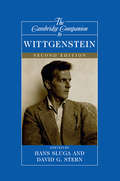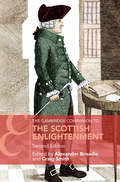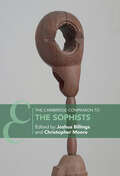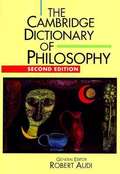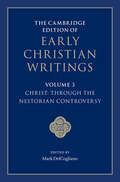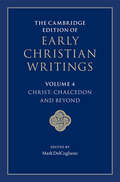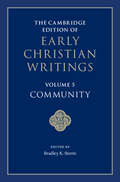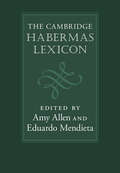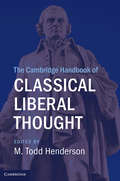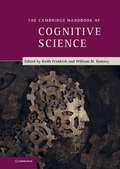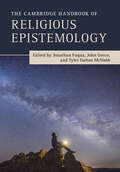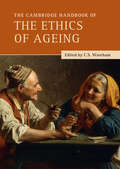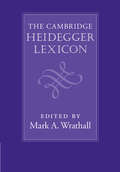- Table View
- List View
The Cambridge Companion to W.E.B. Du Bois
by Shamoon ZamirW. E. B. Du Bois was the pre-eminent African American intellectual of the twentieth century. As a pioneering historian, sociologist and civil rights activist, and as a novelist and autobiographer, he made the problem of race central to an understanding of the United States within both national and transnational contexts; his masterwork The Souls of Black Folk (1903) is today among the most widely read and most often quoted works of American literature. This Companion presents ten specially commissioned essays by an international team of scholars which explore key aspects of Du Bois's work. The book offers students a critical introduction to Du Bois, as well as opening new pathways into the further study of his remarkable career. It will be of interest to all those working in African American studies, American literature, and American studies generally.
The Cambridge Companion to William James
by Ruth Anna PutnamWilliam James (1842-1910) was both a philosopher and a psychologist, nowadays most closely associated with the pragmatic theory of truth. The essays in this Companion deal with the full range of his thought, including technical philosophical issues, religious speculation, moral philosophy and political controversies of his time. New readers and nonspecialists will find this the most convenient and accessible guide to James currently available. Advanced students and specialists will find a conspectus of recent developments in the interpretation of James.
The Cambridge Companion to Wittgenstein (Cambridge Companions to Philosophy)
by Hans Sluga David G. SternLudwig Wittgenstein (1889–1951) is one of the most important and influential philosophers in modern times, but he is also one of the least accessible. In this volume, leading experts chart the development of his work and clarify the connections between its different stages. The essays, which are both expository and original, address central themes in Wittgenstein's writing on a wide range of topics, particularly his thinking about the mind, language, logic, and mathematics. The contributors illuminate the character of the whole body of work by focusing on key topics: the style of the philosophy, the conception of grammar contained in it, rule-following, convention, logical necessity, the self, and what Wittgenstein called, in a famous phrase, 'forms of life'. This revised edition includes a new introduction, five new essays - on Tractarian ethics, Wittgenstein's development, aspects, the mind, and time and history - and a fully updated comprehensive bibliography. An updated edition of this accessible and wide-ranging volume, charting the work of one of the most important philosophers of modern times Includes five entirely new chapters on the mind, time and history, Tractarian ethics, aspects, and Wittgenstein's development. Contains a new introduction which sets Wittgenstein and his thinking in its twentieth-century context, and a fully updated bibliography to reflect advances in recent scholarship.
The Cambridge Companion to the Bloomsbury Group
by Victoria RosnerNamed after a small neighborhood in London where its members settled as young adults, the Bloomsbury Group produced an impressive body of work that yielded British Post-Impressionist painting, literary modernism, the field of macroeconomics, and a new direction for public taste in art. This Companion offers a comprehensive guide to the intellectual and social contexts surrounding Bloomsbury and its coterie, which includes writer Virginia Woolf, economist Maynard Keynes, and art critic Roger Fry, among others. Thirteen chapters from leading scholars and critics explore the Bloomsbury Group's rejection of Victorian values and social mores, their interventions in issues of empire and international politics, their innovations in the literary and visual arts, and more. Complete with a chronology of key events and a detailed guide to further reading, this Companion provides scholars and students of English literature with fresh perspectives on the achievements of this remarkable circle of friends.
The Cambridge Companion to the French Enlightenment
by Daniel BrewerThe Enlightenment has long been seen as synonymous with the beginnings of modern Western intellectual and political culture. As a set of ideas and a social movement, this historical moment, the 'age of reason' of the seventeenth and eighteenth century, is marked by attempts to place knowledge on new foundations. The Cambridge Companion to the French Enlightenment brings together essays by leading scholars representing disciplines ranging from philosophy, religion and literature, to art, medicine, anthropology and architecture, to analyse the French Enlightenment. Each essay presents a concise view of an important aspect of the French Enlightenment, discussing its defining characteristics, internal dynamics and historical transformations. The Companion discusses the most influential reinterpretations of the Enlightenment that have taken place during the last two decades, reinterpretations that both reflect and have contributed to important re-evaluations of received ideas about the Enlightenment and the early modern period more generally.
The Cambridge Companion to the Modern Gothic
by Jerrold E. HogleThis Companion explores the many ways in which the Gothic has dispersed in the twentieth and twenty-first centuries, and in particular how it has come to offer a focus for the tensions inherent in modernity. Fourteen essays by world-class experts show how the Gothic in numerous forms - including literature, film, television, and cyberspace - helps audiences both to distance themselves from and to deal with some of the key underlying problems of modern life. Topics discussed include the norms and shifting boundaries of sex and gender, the explosion of different forms of media and technology, the mixture of cultures across the western world, the problem of identity for the modern individual, what people continue to see as evil, and the very nature of modernity. Also including a chronology and guide to further reading, this volume offers a comprehensive account of the importance of Gothic to modern life and thought.
The Cambridge Companion to the Scottish Enlightenment
by Alexander BroadieA distinguished team of contributors examines the writings of David Hume, Adam Smith, Thomas Reid, Adam Ferguson, Colin Maclaurin and other Scottish thinkers, in philosophy, natural theology, economics, anthropology, natural science and law. The contributors also relate the Scottish Enlightenment to its historical context and assess its impact and legacy in Europe, America and beyond. The volume is of interest to a wide range of readers in philosophy, theology, literature and the history of ideas.
The Cambridge Companion to the Scottish Enlightenment (Cambridge Companions to Philosophy)
by Craig Smith Alexander BroadieThe second edition of this Companion presents a philosophical perspective on an eighteenth-century phenomenon that has had a profound influence on Western culture. A distinguished team of contributors examines the writings of David Hume, Adam Smith, Thomas Reid, Adam Ferguson and other Scottish thinkers. Their subjects range across philosophy, natural theology, economics, anthropology, natural science, and law and the arts, and in addition, they relate the Scottish Enlightenment to its historical context and assess its impact and legacy. The result is a comprehensive and accessible volume that illuminates the richness, the intellectual variety and the underlying unity of this important movement. This volume contains five entirely new chapters on morality, the human mind, aesthetics, sentimentalism and political economy, and eleven other chapters have been significantly revised and updated. The book will be of interest to a wide range of readers in philosophy, theology, literature and the history of ideas.
The Cambridge Companion to the Sophists (Cambridge Companions to Philosophy)
by Christopher Moore Joshua BillingsThe Classical Greek sophists – Protagoras, Gorgias, Prodicus, Hippias, and Antiphon, among others – are some of the most important figures in the flourishing of linguistic, historical, and philosophical reflection at the time of Socrates. They are also some of the most controversial: what makes the sophists distinctive, and what they contributed to fifth-century intellectual culture, has been hotly debated since the time of Plato. They have often been derided as reactionaries, relativists or cynically superficial thinkers, or as mere opportunists, making money from wealthy democrats eager for public repute. This volume takes a fresh perspective on the sophists – who really counted as one; how distinctive they were; and what kind of sense later thinkers made of them. In three sections, contributors address the sophists' predecessors and historical and professional context; their major intellectual themes, including language, ethics, society, and religion; and their reception from the fourth century BCE to modernity.
The Cambridge Companion to the Stoics
by Brad InwoodThis unique volume offers an odyssey through the ideas of the Stoics in three particular ways: first, through the historical trajectory of the school itself and its influence; second, through the recovery of the history of Stoic thought; third, through the ongoing confrontation with Stoicism, showing how it refines philosophical traditions, challenges the imagination, and ultimately defines the kind of life one chooses to lead. A distinguished roster of specialists have written an authoritative guide to the entire philosophical tradition. The first two chapters chart the history of the school in the ancient world, and are followed by chapters on the core themes of the Stoic system: epistemology, logic, natural philosophy, theology, determinism, and metaphysics. There are two chapters on what might be thought of as the heart and soul of the Stoics system: ethics.
The Cambridge Dictionary of Philosophy
by Robert Audi Paul AudiThis is the most authoritative and comprehensive one-volume dictionary of philosophy available in English. It contains over 4,000 entries, which range in length from 100 to 4,000 words. The Dictionary has been written by an international team of over 350 experts, so, rather than offering the limited perspective of a single writer, it distils the collective knowledge of the professional community of philosophers in an accessible manner. The Cambridge Dictionary clearly and concisely defines both technical terms and crucial concepts, and will promote the understanding of philosophy on all levels and across all fields. It includes substantial explanatory articles on all major philosophers as well as hundreds of minor figures. There are expansive, up-to-date overviews of all the important sub-disciplines such as ethics, epistemology, metaphysics, philosophy of mind and logic. No other reference work on philosophy contains so many entries on related subjects such as cognitive science, linguistics, theology, law, history of science and literature.
The Cambridge Dictionary of Philosophy
by Robert AudiThis is the most authoritative and comprehensive one-volume dictionary of philosophy available in English. It contains over 4,000 entries, which range in length from 100 to 4,000 words. The Dictionary has been written by an international team of over 350 experts, so, rather than offering the limited perspective of a single writer, it distils the collective knowledge of the professional community of philosophers in an accessible manner. The Cambridge Dictionary clearly and concisely defines both technical terms and crucial concepts, and will promote the understanding of philosophy on all levels and across all fields. It includes substantial explanatory articles on all major philosophers as well as hundreds of minor figures. There are expansive, up-to-date overviews of all the important sub-disciplines such as ethics, epistemology, metaphysics, philosophy of mind and logic. No other reference work on philosophy contains so many entries on related subjects such as cognitive science, linguistics, theology, law, history of science and literature.
The Cambridge Dictionary of Philosophy (2nd edition)
by Robert AudiThis new edition of a one-volume dictionary of philosophy features expansions in standing entries and the addition of some 400 new ones across the entire range of the subject, including selective coverage of a number of living philosophers. It covers not only Western and European philosophy, but also African, Arabic, Islamic, Japanese, Jewish, Korean, and Latin-American. In addition to major philosophers, entries include rapidly developing fields such as the philosophy of mind and applied ethics (bioethics, environmental, medical and professional). Audi is Charles J. Mach Distinguished Professor of Philosophy, U. of Nebraska at Lincoln.
The Cambridge Edition of Early Christian Writings: Volume 3, Christ: Through the Nestorian Controversy (The Cambridge Edition of Early Christian Writings #3)
by Mark DelCoglianoThe Cambridge Edition of Early Christian Writings provides the definitive anthology of early Christian texts from ca. 100 CE to ca. 650 CE. Its volumes reflect the cultural, intellectual, and linguistic diversity of early Christianity, and are organized thematically on the topics of God, Practice, Christ, Community, Reading, and Creation. The series expands the pool of source material to include not only Greek and Latin writings, but also Syriac and Coptic texts. Additionally, the series rejects a theologically normative view by juxtaposing texts that were important in antiquity but later deemed 'heretical' with orthodox texts. The translations are accompanied by introductions, notes, suggestions for further reading, and scriptural indices. The third volume focuses on early Christian reflection on Christ as God incarnate from the first century to ca. 450 CE. It will be an invaluable resource for students and academic researchers in early Christian studies, history of Christianity, theology and religious studies, and late antique Roman history.
The Cambridge Edition of Early Christian Writings: Volume 4, Christ: Chalcedon and Beyond (The Cambridge Edition of Early Christian Writings #Series Number 3)
by Mark DelCoglianoThe Cambridge Edition of Early Christian Writings provides the definitive anthology of early Christian texts from ca. 100 CE to ca. 650 CE. Its volumes reflect the cultural, intellectual, and linguistic diversity of early Christianity, and are organized thematically on the topics of God, Practice, Christ, Community, Reading, and Creation. The series expands the pool of source material to include not only Greek and Latin writings, but also Syriac and Coptic texts. Additionally, the series rejects a theologically normative view by juxtaposing texts that were important in antiquity but later deemed 'heretical' with orthodox texts. The translations are accompanied by introductions, notes, suggestions for further reading, and scriptural indices. The fourth volume focuses on early Christian reflection on Christ as God incarnate from ca. 450 CE to the eighth century. It will be an invaluable resource for students and academic researchers in early Christian studies, history of Christianity, theology and religious studies, and late antique Roman history.
The Cambridge Edition of Early Christian Writings: Volume 5, Community (The Cambridge Edition of Early Christian Writings)
by Bradley K. StorinThe Cambridge Edition of Early Christian Writings provides the definitive anthology of early Christian texts, from ca. 100 CE to ca. 650 CE. Its volumes reflect the cultural, intellectual, and linguistic diversity of early Christianity, and are organized thematically on the topics of God, Practice, Christ, and Community. The series expands the pool of source material to include not only Greek and Latin writings, but also Syriac and Coptic texts. Additionally, the series rejects a theologically normative view by juxtaposing texts that were important in antiquity but later deemed 'heretical' with orthodox texts. The translations are accompanied by introductions, notes, suggestions for further reading, and scriptural indices. The fifth and final volume focuses on the theme of community within early Christian writings-how Christians joined the community, how they managed the community, how they conceptualized the community, and how they policed the community. It will be an invaluable resource for students and academic researchers in early Christian studies, history of Christianity, theology and religious studies, and late antique Roman history.
The Cambridge Foucault Lexicon
by Leonard Lawlor John NaleThe Cambridge Foucault Lexicon is a reference tool that provides clear and incisive definitions and descriptions of all of Foucault's major terms and influences, including history, knowledge, language, philosophy and power. It also includes entries on philosophers about whom Foucault wrote and who influenced Foucault's thinking, such as Deleuze, Heidegger, Nietzsche and Canguilhem. The entries are written by scholars of Foucault from a variety of disciplines such as philosophy, gender studies, political science and history. Together, they shed light on concepts key to Foucault and to ongoing discussions of his work today.
The Cambridge Habermas Lexicon
by Amy Allen Eduardo MendietaOver a career spanning nearly seven decades, Jürgen Habermas - one of the most important European philosophers of the twentieth and twenty-first centuries - has produced a prodigious and influential body of work. In this Lexicon, authored by an international team of scholars, over 200 entries define and explain the key concepts, categories, philosophemes, themes, debates, and names associated with the entire constellation of Habermas's thought. The entries explore the historical, philosophical and social-theoretic roots of these terms and concepts, as well as their intellectual and disciplinary contexts, to build a broad but detailed picture of the development and trajectory of Habermas as a thinker. The volume will be an invaluable resource for students and scholars of Habermas, as well as for other readers in political philosophy, political science, sociology, international relations, cultural studies, and law.
The Cambridge Handbook of Classical Liberal Thought
by M. Todd HendersonPolls suggest up to twenty percent of Americans describe their beliefs as 'libertarian', but libertarians are often derided as heartless Social Darwinists or naïve idealists. This illuminating handbook brings together scholars from a range of fields (from law to philosophy to politics to economics) and political perspectives (right, left, and center) to consider how classical liberal principles can help us understand and potentially address a variety of pressing social problems including immigration, climate change, the growth of the prison population, and a host of others. Anyone interested in political theory or practical law and politics will find this book an essential resource for understanding this major strand of American politics.
The Cambridge Handbook of Cognitive Science
by Keith Frankish William RamseyCognitive science is a cross-disciplinary enterprise devoted to understanding the nature of the mind. In recent years, investigators in philosophy, psychology, the neurosciences, artificial intelligence, and a host of other disciplines have come to appreciate how much they can learn from one another about the various dimensions of cognition. The result has been the emergence of one of the most exciting and fruitful areas of inter-disciplinary research in the history of science. This volume of original essays surveys foundational, theoretical, and philosophical issues across the discipline, and introduces the foundations of cognitive science, the principal areas of research, and the major research programs. With a focus on broad philosophical themes rather than detailed technical issues, the volume will be valuable not only to cognitive scientists and philosophers of cognitive science, but also to those in other disciplines looking for an authoritative and up-to-date introduction to the field.
The Cambridge Handbook of Religious Epistemology
by Tyler Dalton McNabb John Greco Jonathan FuquaThe Cambridge Handbook of Religious Epistemology, the first to appear on the topic, introduces the current state of religious epistemology and provides a discussion of fundamental topics related to the epistemology of religious belief. Its wide-ranging chapters not only survey fundamental topics, but also develop non-traditional epistemic theories and explore the religious epistemology endorsed by non-Western traditions. In the first section, Faith and Rationality, readers will find new essays on Reformed epistemology, skepticism and religious belief, and on the nature of evidence with respect to religious belief. The rich second section, Religious Traditions, contains chapters on Hindu, Buddhist, Islamic, Jewish, and Christian epistemologies. The final section, New Directions, contains chapters ranging from applying disjunctivism and knowledge-first approaches to religious belief, to surveying responses to debunking arguments. Comprehensive and accessible, this Handbook will advance the field for years to come.
The Cambridge Handbook of the Ethics of Ageing
by C. S. WarehamWe're all getting older from the moment we're born. Ageing is a fundamental and ubiquitous aspect of life. Yet in ethics, not much work is done on the questions surrounding ageing: how do diachronic features of ageing and the lifespan contribute to the overall value of life? How do time, change, and mortality impact on questions of morality and the good life? And how ought societies to respond to issues of social justice and the good, balancing the interests of generations and age cohorts? In this Cambridge Handbook, the first book-length attempt to stake this terrain, leading moral philosophers from a range of sub-fields and regions set out their approaches to the conceptual and ethical understanding of ageing. The volume makes an important contribution to significant debates about the implications of ageing for individual well-being, social policy and social justice.
The Cambridge Handbook of the Psychology of Aesthetics and the Arts
by Pablo P. L. Tinio Jeffrey K. SmithThe psychology of aesthetics and the arts is dedicated to the study of our experiences of the visual arts, music, literature, film, performances, architecture and design; our experiences of beauty and ugliness; our preferences and dislikes; and our everyday perceptions of things in our world. The Cambridge Handbook of the Psychology of Aesthetics and the Arts is a foundational volume presenting an overview of the key concepts and theories of the discipline where readers can learn about the questions that are being asked and become acquainted with the perspectives and methodologies used to address them. The psychology of aesthetics and the arts is one of the oldest areas of psychology but it is also one of the fastest growing and most exciting areas. This is a comprehensive and authoritative handbook featuring essays from some of the most respected scholars in the field.
The Cambridge Heidegger Lexicon
by Mark A. WrathallMartin Heidegger (1889–1976) was one of the most original thinkers of the twentieth century. His work has profoundly influenced philosophers including Jean-Paul Sartre, Simone de Beauvoir, Maurice Merleau-Ponty, Michel Foucault, Jacques Derrida, Hannah Arendt, Hans-Georg Gadamer, Jürgen Habermas, Charles Taylor, Richard Rorty, Hubert Dreyfus, Stanley Cavell, Emmanuel Levinas, Alain Badiou, and Gilles Deleuze. His accounts of human existence and being and his critique of technology have inspired theorists in fields as diverse as theology, anthropology, sociology, psychology, political science, and the humanities. This Lexicon provides a comprehensive and accessible guide to Heidegger's notoriously obscure vocabulary. Each entry clearly and concisely defines a key term and explores in depth the meaning of each concept, explaining how it fits into Heidegger's broader philosophical project. With over 220 entries written by the world's leading Heidegger experts, this landmark volume will be indispensable for any student or scholar of Heidegger's work.
The Cambridge History of Medieval Philosophy
by Robert Pasnau Robert Pasnau Christina Van Dyke Christina Van DykeThe Cambridge History of Medieval Philosophy comprises over fifty specially commissioned essays by experts on the philosophy of this period. Starting in the late eighth century, with the renewal of learning some centuries after the fall of the Roman Empire, a sequence of chapters take the reader through developments in many and varied fields, including logic and language, natural philosophy, ethics, metaphysics, and theology. Close attention is paid to the context of medieval philosophy, with discussions of the rise of the universities and developments in the cultural and linguistic spheres. A striking feature is the continuous coverage of Islamic, Jewish, and Christian material. There are useful biographies of the philosophers, and a comprehensive bibliography. The volume illuminates a rich and remarkable period in the history of philosophy and will be the authoritative source on medieval philosophy for the next generation of scholars and students alike.

